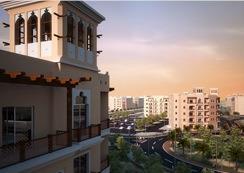
The Middle East feels like the place to be at the moment from a fresh produce perspective. Geographically well-positioned to supply the world’s up-and-coming markets and with a stable, if sometimes challenging, climate, producers are expressing optimism about the future of trade.
The United Arab Emirates might be associated with wealth and prosperity, but even there the global financial crisis has taken its toll. However producers are now upbeat that recovery is well and truly underway. “The financial situation in the Gulf region has been improving in the last few years,” explains Ali Bidshahri, general manager of Dubai-based fresh produce business Yalda Trading. “In the UAE, this is apparent by the rise of the real estate market. Also, tourism is booming which means an increase in demand from restaurants, hotels, and catering companies. The growth in population means higher consumption, which has been very good for us, so thankfully we are not facing any challenges
at present.”
There’s a similar situation in Morocco, where producers report that a burgeoning domestic market is changing the dynamics of supply. “We are actually struggling to export because of the internal market,” says Fatiha Charrat, sales and marketing director at Delassus. “Growers are having a very good season so they are happy, but exporters are not. The prices growers are getting are higher than the expected export price. For example a carton delivered to the UK must be sold at £10 delivered to the customer – compared with £8.50-£9 before – to be able to get the price growers are getting in Morocco”.
With Ramadan coming up in July, domestic demand for fruit and vegetables is expected to be even higher over the next few weeks.
Over in Egypt, producers are speaking optimistically about a new grape season that is set to be boosted by a forecast for a good-quality and high-volume crop. And like in other Middle Eastern countries, growers are seeing the potential for supplying beyond traditional borders.
Charrat says Delassus is upbeat about the opportunities for increasing exports into the wider Middle East region via a new direct shipping line from Tangier to Dubai and Jeddah in Saudi Arabia. Or and Nadorcott oranges will be the prime crop to be sent on the new line, which will see containers replacing vessels. And that’s just one of the new developments at the company, which is also planting a new 128ha farm in Marrakesh and expects the first crop of Nadorcott within three years.
Specifically for the UK, Delassus is planting a new cherry tomato farm at Agadir, an investment made to ensure 12-month supply to supermarket customers in this country.
Across the region there are signs of positivity and optimism, but inevitably in the Middle East, it’s not all good news, with political instability having an impact in a number
of countries.
Earlier this year the UN Food and Agriculture Organisation (FAO) reported that the ongoing conflict in Syria has led to a major decrease in production of fruit and vegetables, in some areas by as much as a half, with the governorate of Homs reportedly experiencing a fall in vegetable production of some 60 per cent.
Out of around 10 million Syrians living in rural areas, or approximately 46 per cent of the population, 80 per cent rely on agriculture for their livelihood, the FAO revealed, adding that many farmers were suffering from a lack of access to agricultural inputs, including quality seeds and fertilisers, and a lack of irrigation due to damage to canals and shortages of fuel for irrigation pumps. —
LOOKING EAST
UAE producer Yalda Trading is expanding its horizons with the establishment of its own branch in the Philippines for the direct sourcing of bananas. Production in the south-east Asian country was hit by a typhoon in 2012 that affected output, but Latin American supply was enough to reduce the impact on the market.
A CALL FOR GLOBAL ACTION
Potato producers in Abu Dhabi are preparing for their biggest harvest yet, according to Abu Dhabi Farmers’ Services Centre (ADFSC).
The 2012-13 season will be the third year of the ADFSC potato programme, which allows farmers to pay for the imported French seeds after the crops have been harvested and sold.
“This year, we are expecting to nearly triple the amount of local potatoes produced with nearly 2,500 tonnes,” said Chris Hirst, CEO of ADFSC. “Compare this to just under 900t last year.”
ADFSC’s aim is to increase food security by adding to the variety of vegetables grown locally. Potatoes were chosen as they are more water-efficient than many other alternatives and can be stored for long periods of time.
“The situation has now recovered back to a stable state. We have yet to face any difficulties and at this point in time things are coming along smoothly,” says general manager Ali Bidshahri.
Once the Philippines office is fully up and running, Yalda Trading plans to create its own banana brand, as well as exploring new markets. —






No comments yet